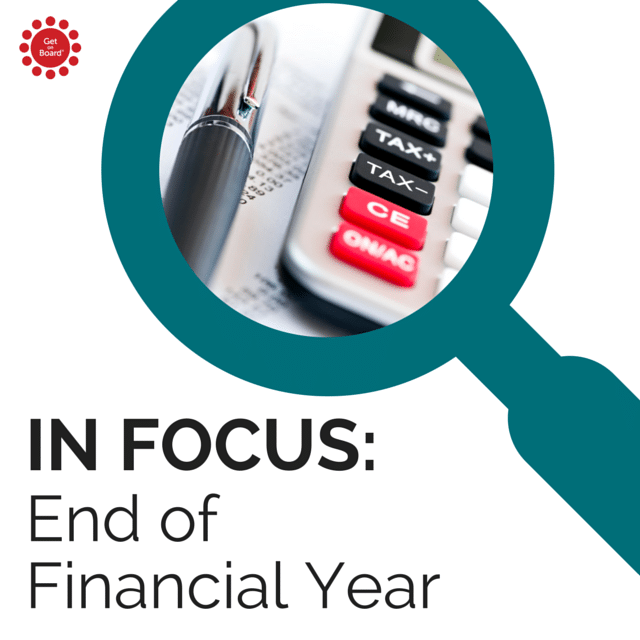In Focus: End of Financial Year

The month of June brings with it the end of financial year – a time of year where many organisations are reviewing business performance over the past year, looking forward to the year ahead, and setting budgets to achieve business goals. End of financial year is also a useful time to review your financial practices and processes for improvements and efficiencies.
Throughout June we have be sharing information about the board and tasks it undertakes at the end of each financial year. These tasks include reviewing the financial performance of the business over the past year (this is also done regularly throughout the year), ensuring an audit is undertaken, and setting the organisation’s budget for the year ahead so that the business objectives can be realised.
The following is a selection of resources that we have shared over the past month that will give you more of an understanding of the relationship between the board and the end of financial year.
Directors and Financial Reporting by Australian Securities and Investments Commission (ASIC)
This information sheet prepared by the corporate watchdog – ASIC – explains your financial reporting responsibilities as a director. It covers: your general duties; your company’s duty to keep proper books and records; your financial reporting obligations; your financial knowledge obligations; and, your relationship with the auditor. Read more.
The Art of Financial Management by Better Boards
It is important for boards of non-profit and community sector organisations to focus on strong financial management. There are three key steps in financial management; getting these steps right will help your board manage its financial resources wisely, build stakeholder support and secure high quality directors. Read more.
What is an audit? by PwC Australia
An audit is the examination of the financial report of an organisation – as presented in the annual report – by someone independent of that organisation. The purpose of an audit is to form a view on whether the information presented in the financial report, taken as a whole, reflects the financial position of the organisation at a given date. Read more.
5 Financial Key Performance Indicators to Gauge Your Business’s Health by Intuit
There is no substitute for concrete numbers when it comes to measuring your business’s financial health. That’s where financial KPIs come in.
Keeping close tabs on your business’s financial performance is essential to long-term success. These five financial KPIs will help you answer the question: Is the business meeting its goals? Read more.
What’s involved in being a treasurer of a not-for-profit group by Our Community
Anyone taking on the role of treasurer in a not-for-profit organisation must have – or needs to learn – a basic understanding of accounting and a working knowledge of the laws governing the organisation’s operation. Here is a comprehensive overview of the treasurer’s main duties. Read more.
Five New Financial Year Resolutions that Could Change the Business by Richard Perkins, Hayes Knight
What does the board wish for the business this coming financial year? Less uncertainty? More money? More capacity to capitalise on opportunities? In this post Hayes Knight’s Richard Perkins shares five resolutions that every business should consider making. Read more.
Check out our Twitter and LinkedIn feeds for links to many more articles looking at strategy and the board. Be sure to subscribe to these channels to keep updated with information for new and aspiring company directors.
